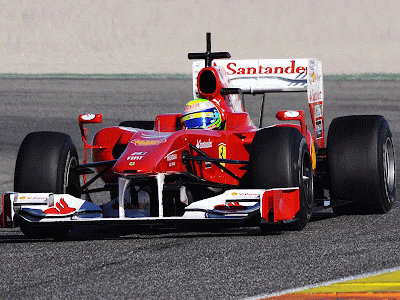Scuderia Ferrari unveiled today its 2010 challenger, the Ferrari F10. The F10 single-seater was presented with a new livery, with both the front and the rear wing white painted. The F10 is the fifty-sixth single-seater built by Ferrari, specifically to compete in the Formula 1 World Championship. The name of the car renews the tradition of being linked to the year in which it makes its debut in the Championship. The project, which went by the internal code number 661, represents the Scuderia's interpretation of the technical and sporting regulations which apply in 2010.
2010 Ferrari F10 Formula 1
The rule clarifications issued by the FIA during the course of the previous season as regards to the diffuser have opened up new scenarious for the designers in terms of freeing up this area, thus representing the opportunity to deliver potentially great performance advantages. Compared to the F60, the F10 was obviously conceived with the aim of maximizing the aerodynamic performance of the double diffuser. Therefore the engine mountings to the chassis have been modified in a specific way and also redesigned is the shape of the gearbox casing and the rear suspension layout.
2010 Ferrari F10 Formula 1
It only takes a quick glance to note that the front part of the chassis is considerably higher than on last year's car and that the central upper and lower surfaces are hollowed out, in order to improve airflow. Another major rule change is that race refuelling is banned, which means the fuel cell has to be big enough to allow the car to get to the end of the race, whatever type of circuit. Inevitably, the car is longer to accommodate the new fuel tank and to allow the installation of longer and narrower radiators so that the sidepods have a smaller higher aperture with a more cut-out shape at the bottom. A further tapering as been achieved thanks to a revised and unconventional configuration of the exhausts.
2010 Ferrari F10 Formula 1
The need to start the race with a much heavier car than in the past has required a redesign of the basic characteristics of the braking system, carried out in conjunction with Brembo as well as a new design for the relevant cooling system.
2010 Ferrari F10 Formula 1
Safety levels have been increased thanks to the introduction of new crash tests of the rear bulkhead and the cell with a full load. In light of past incidents and the fact that pit stops will take less time, the wheel nuts have been updated so as to increase security when the car is sent back out on track.
2010 Ferrari F10 Formula 1
Before its track debut, the F10 underwent an intensive dynamic and static bench test program. Significant developments on all areas of the car are built into the program, not just in the run up to the opening round of Bahrain, but throughout the entire year.
2010 Ferrari F10 Formula 1
As always, much attention has been paid to the performance and optimization of the materials used, at the design stage and through quality control, in an effort to extract the maximum level of performance combined with the highest possible safety levels.






